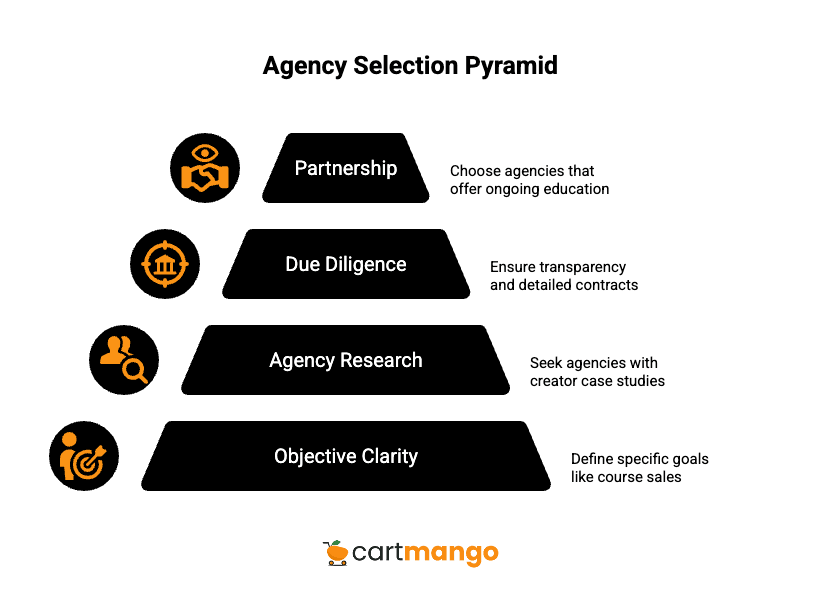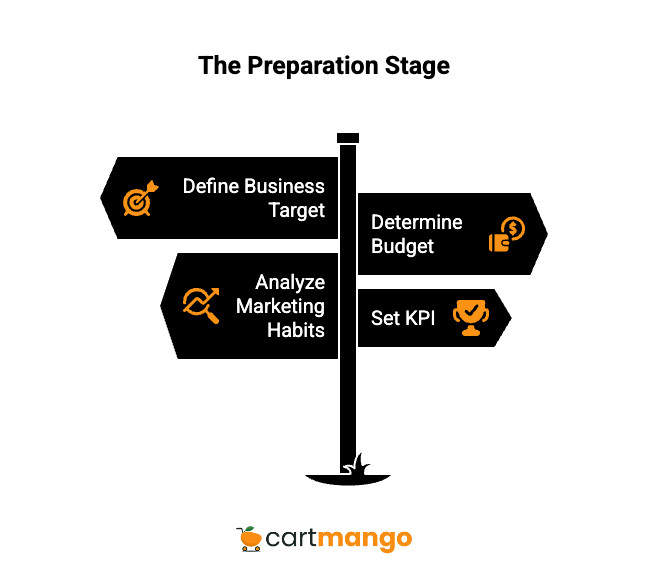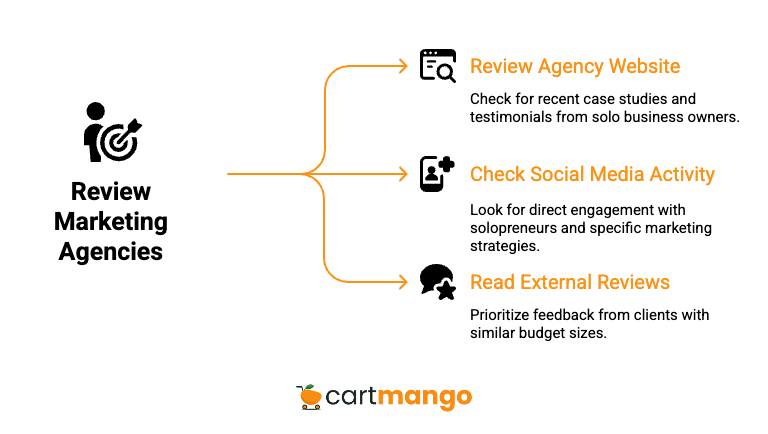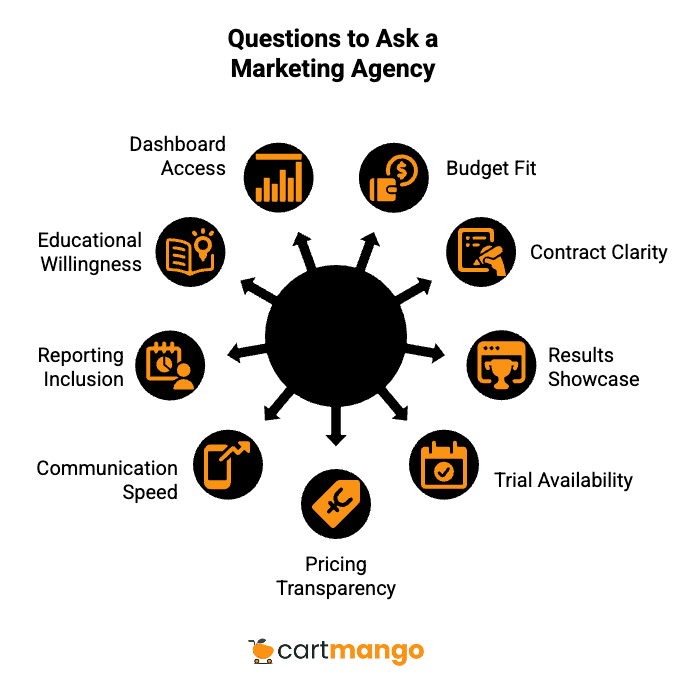To hire a digital marketing agency, define your main goal and budget, shortlist agencies with business results, vet thoroughly, secure clear contracts, and only partner with those offering transparent, accountable communication and data ownership.
–
For the 9 questions to ask before hiring a digital marketing agency, go here.
–
Quick-Start
You want an agency to help you win more customers.
Start by pinning down your real objective – maybe it’s selling 25 courses monthly or building your consulting list. Figure out how much you can spend without risking your business.
Find agencies that post case studies about working with creators or solo businesses, not just big corporate jobs. Your shortlist should be 2 to 4 agencies, tops. Stick with those that show you real numbers, describe their team and steps transparently, and give you a written contract that covers the details.
Work only with partners who teach you along the way. Never skip over red flags or sign agreements you don’t fully understand.

Preparation
Think about what you want. What’s your single biggest business target?
- More gigs?
- More product downloads?
- A bigger following?
Decide how much you can actually invest. Most solo creators can work with agencies for $1,500–$3,000 per month, but don’t stretch yourself too thin. If your budget is tight, you can always start smaller or hire a good freelancer.
List your current marketing habits. Was your last success from email? Instagram? Ads? Write it down.
Also take note of what’s failed before, whether it’s a channel or a tactic.
Pin down what counts as a win for you. Choose one main KPI – maybe it’s leads or sales – so you’ll actually know what “success” should look like.
You don’t need to create a long requirements doc. Seriously, one page is just fine. Keep it practical. Agencies want real information, not filler.
If you want honest strategy help, spell it out. Or if you’re just looking for someone who executes quickly, be clear about that from the start.

Where (and How) to Source Agencies That “Get” Solos
The hunt for solo-friendly agencies starts with research. Avoid those that focus on enterprise clients and display only big corporate wins. You need firms familiar with launches for course creators, independent consultants, and digital product sellers.
Here are 4 marketing places you can use to find a suitable marketing agency:
If you have a particular marketing agency in mind (via browsing or recommendation), do this:
- Review each agency’s website.
- Are they updating recent case studies for course launches, creator platforms, or consulting funnels?
- Scan for testimonials from solo business owners, not just quotes from department heads at larger brands.
Check their activity on social media platforms. Posting blog articles or tips isn’t enough. Look for agencies answering direct questions from solopreneurs, sharing landing page strategies, and talking about specific wins in email marketing, content creation, or google ads.
Reading external reviews is your next step. Prioritize feedback from clients running marketing campaigns with budgets matching yours. Most agencies willing to talk openly with solo founders will show up here.
Narrow your research to 3-4 agencies. Reaching out to too many creates busywork and confusion.
If an agency offers free consultations, book one. Use that session to discuss business website improvements, google analytics, content marketing plans, or how they track performance for competitors.
Final checkpoint: agencies specializing in solo business brands embrace frequent communication, practical results, and updated tactics – not just buzzwords. Trim your list aggressively. This direct approach saves time, boosts confidence, and leads to a successful marketing campaign.

How to Vet Agencies FAST as a Lean Business
You need a clear, reliable process to compare potential partners objectively.
It’s tough to make a smart hiring decision with just a gut feeling or fancy website. Take a step-by-step approach. This puts you in control and lets you weed out hype fast.
1/ Go for Simple Packages
Solo creators and consultants have specific needs, so don’t let agencies distract you with add-on bundles or endless upsell options.
Ask for the most basic package first and compare it against your needs. Most agencies will show you their starter tier. If they push for “enterprise” options or combine too many services, that’s a signal they’re not focused on businesses your size.
Case studies should be core to their offer. Don’t settle for generic “results for global brands.” Look for campaigns that supported course launches, small product releases, or one-on-one coaching growth.
Ask for proof – not just vague testimonials, but actual numbers and explanations of what was done.
2/ Understand Contract Minimums
Time can be wasted negotiating contract details if you’re not upfront.
Request specifics right away. Is there a three-month minimum? Can you try a one-month trial before committing?
A good agency will be flexible.
Fast onboarding means you can see results and change things if needed. Most reputable partners will start in 7–14 days once contracts are signed. Anything longer often means delays, bureaucracy, or slow processes.
3/ Who Does The Work
Ownership and accountability matter for solo entrepreneurs.
Clarify who runs your account: you want direct access to a senior strategist, owner, or marketer – not shuffled between junior staff or random “account managers.”
Ask if you’ll be speaking regularly with the person actually executing the marketing campaign.
If they delegate everything to junior staff without your say, reconsider. You need confidence; talking to decision-makers prevents miscommunication.
4/ Ask for Specifics
Reporting is what keeps you grounded. Request sample reports before you sign.
Ask what metrics they track – sales, leads, cost per acquisition – not just website hits or reach.
The first dashboard should include results tied to your main goal, presented in ways you understand. Make sure you know how and when reporting will happen (weekly? monthly? live dashboard access?).
If the system is confusing or they dodge your questions, think twice.
5/ Spotting Red Flags
Stay sharp. Recognize pushy sales tactics, vague case studies, hidden fees, or lack of clear communication.
If an agency refuses transparency or can’t explain past client results for creators, solo founders or course sellers, cut them from your shortlist.
Talk is easy. Reliable partners show you numbers, plans, and real examples.
Agency Vetting Table (with filled-in examples)
Here’s a sample table you can use to keep track. Fill it out and keep it close as you make your final hiring decision.
Agency Name | Monthly Price | Niche Experience (Creator/Coach/Product Seller) | Real Case Study Provided? | Main Contact | Speed to Launch (Days) | Client Fit (1–5) | Notes/Red Flags |
|---|---|---|---|---|---|---|---|
Agency A | $1,800 | Yes | Yes | Direct Owner | 7 | 5 | Flexible trial, no upsells |
Agency B | $2,000 | Yes | Yes | Dedicated Marketer | 5 | 4 | Fast reporting, clear contract |
Agency C | $2,500 | No (Corporate) | No | Account Manager | 14 | 2 | Pushy, vague, expensive |
Agency D | $1,600 | Yes | Yes | Owner | 10 | 3 | Limited channels, but transparent |
How to use:
- List up to 4 agencies you’re considering.
- Fill in each cell with info from your calls and website checks.
- Write deal-breakers in “Notes/Red Flags.”
- Rank “Fit” (1-5) by how well they match your creative goals.
- Only move forward with agencies that score above 3 and have no major red flags.
Final Checks and Smart Vetting
Most agencies have formal processes, but don’t be afraid to push for details that matter to you: clear project ownership, startup-friendly pricing, documentation, and transparency.
Ask for a call or free consultation to clarify any uncertainties.
If the agency shows up prepared, understands your product or offering, and isn’t pitching just the latest marketing trends for big companies, you’re on the right track.
Stay persistent. Even successful creatives sometimes find the vetting process a daunting task.
If you document everything in your agency table, you’ll make your hiring decision with confidence.
Your Selection Checklist
Before you sign, run every agency through this checklist. It keeps you honest, keeps them honest. No skipping items.
Criteria | Yes / No | Notes |
|---|---|---|
Package fits my budget | ||
Clear, written contract provided | ||
Agency shows creator/coach/small business results | ||
Trial/starter period (max. 3 months) available | ||
All-in pricing (no surprise “add-on” fees) | ||
Rapid response; comms reply within 1–2 business days | ||
Meetings/reporting included (not extra cost) | ||
Agency willing to educate me as we work together | ||
Agency provides access to live reporting dashboard |
How to use:
- Mark “Yes” or “No” for each agency you’re considering.
- Add extra notes if a box is “No”.
- If ANY essential criteria are ‘No’, take a pause, ask questions, and reconsider.
- Only move forward with agencies that tick every box.
Questions to Ask (Copy/Paste Scripts): Matching the Selection Checklist Above

You want every agency to give straight answers before you move forward. Just copy, paste, and ask these direct questions before you make any decisions.
1/ Package fits my budget
“What’s your monthly price for the starter package?
2/ Clear, written contract provided
“Will you send me a written contract before we start, so I can review all terms upfront?”
3/ Agency shows creator/coach/small business results
“Can I see a case study or campaign example for a solo creator, coach, or small business?”
4/ Trial/starter period (max. 3 months) available
“Do you offer short-term starter periods – three months or less – before longer commitments?”
5/ All-in pricing (no surprise “add-on” fees)
“Is everything I need (calls, meetings, reporting, edits) included, or are some items billed as add-ons?”
6/ Rapid response; comms reply within 1–2 business days
“How quickly do you reply to emails or questions? Will I have a direct contact person for fast answers?”
7/ Meetings/reporting included (not extra cost)
“Are regular meetings and campaign reports part of your package, or do those trigger extra charges?”
8/ Agency willing to educate me as we work together
“Are you willing to explain campaign choices or offer guides so I understand what’s happening?”
9/ Agency provides access to live reporting dashboard
“Will I get live, ongoing access to campaign dashboards or reporting platforms?”
–
Send these questions to every agency you’re considering. Their answers will tell you if they meet your real needs – or just want your budget. If any reply feels vague, overpriced, or unhelpful, cross that agency off your shortlist.
How to Negotiate, Avoid Upsells & Scope Creep
Solo businesses run on tight budgets. You want no surprises hidden behind “strategy meetings” or “premium service fees.”
Say this when you’re at the negotiation stage:
- “Are setup fees, calls, reporting, and edits all part of the base package, or is anything extra?”
- “I’m not interested in multi-channel packages unless we’ve proven the results together on one channel first. Can we start with just [Google Ads] or [email marketing] and add more only after seeing ROI?”
Be clear about trial and contract length:
- “I’m only comfortable signing for [one to three] months at first. Can we avoid long-term commitments until I’ve seen results for my business?”
- “If my needs change or my budget shifts, what’s the process for scaling back, pausing service, or dropping a channel?”
Push for documentation on everything:
- “Can you send me a written scope of work and pricing model before I sign, so there are no misunderstandings later? Please include meetings, reports, edits, and anything outside the core campaign.”
On prepayment and flexibility:
- “I’m not able to pay more than one month up front unless you can show me three real references or verified campaign results for solo businesses.”
- “If my business needs to pause or scale back, how quickly can you make those changes, and will my unused budget roll over?”
If they suggest upgrades or upsells you don’t need:
- “Let’s focus on what’s already working for me. If you see something you think will improve my business, show me case studies for solo founders.”
- “If something is optional, I’d like pricing separated out, so I can decide later.”
If you don’t get straightforward answers, keep searching.
Negotiating with direct, clear language puts you in control and shows agencies you expect honesty – not sales.
These phrases give you leverage, make things clear for both sides, and protect your marketing budget from surprises. If you sense resistance or get vague answers, stay firm or look for another agency.
Red Flags

You’re not a big corporation. Don’t let anyone treat you like one. Spotting the wrong agency early saves money, time, and motivation.
If you hear jargon-heavy processes, consider it a red light.
Accurate agencies don’t push for channels, bundles, or platforms you didn’t ask for. Stick with what you know works, then test new options slowly.
- Lack of creator/solo wins in their history? That’s not a small thing. Move on.
- Hard sales tactics all the time – discounts, urgency, limited time offers – rarely work if you always do it.
- Who’s working on your account? If the answer is vague, rethink your partnership.
- Unclear deliverables or blurry account/data ownership? It’s not worth the risk.
- Agency just offers “packages” but doesn’t let you review or ask questions? You deserve better.
If reporting or client communication is restricted, you’ll struggle to track progress. Agencies that penalize you for scaling down or cutting spend shouldn’t be trusted. Want a sanity check on fraud or agency scams? See this.
Onboarding & First 30 Days
You’ve picked your partner. Both sides should know what comes next.
Share your logins, but always keep admin access. Don’t give away control.
Kickoff call: set targets for the first 30 days – specific deliverables, not vague promises. Write down your KPIs before the meeting.
The report must make sense to you. Ask for clear numbers, explanations, and next steps. Don’t settle for a dashboard you can’t read.
Decide now on a regular check-in routine. Weekly calls or messages help solve issues fast.
Hope for the best, but have a backup plan. Know what happens if results are bad.
Reserve a bit of your budget for fast tests or fixes.
Upgrading Your Marketing Efforts After Hiring an Agency
Maximize Your Next Marketing Campaign
After onboarding, you want your successful marketing campaign to go beyond hope.
Set clear business goals and use your agency partner for specific tasks like search engine optimization, google ads, and website traffic. Use google analytics to measure success, track content marketing, and check landing pages performance.
Great agencies specialize in up to date digital marketing activities and will introduce you to the latest marketing trends and industry experts.
Keep your marketing budget tight. Paid search and pay per click are useful, but always cross-check results against your target audience and lead generation goals.
If you need more insight, ask for competitor analysis, ongoing advice for your business website, and tips for engaging on relevant social media platforms.
Getting More Out of an Experienced Marketing Agency
Most agencies offer free consultations. Use these to clarify your unique creative goals and make every marketing campaign stronger.
Get clear advice on effective content creation, graphic design for new landing pages, or web design refreshes, especially if you’re pushing for fresh ideas and better marketing strategies.
Check if your marketing consultant offers support for social media marketing, email marketing, or managing all your social media accounts (with a reasonable fee of course).
A smart agency is always checking media outlets, tracking google search rankings, and suggesting optimizations your in house team might miss if you’re working with limited internal resources.
Evaluating and Collaborating for Better Results
Not all marketing companies or seo agencies are the same.
Ask if they support you with tools like marketing software or ad managers. A good agency will review your brand guidelines, help you create landing pages that actually convert, and give feedback on your digital marketing strategy.
When you’re looking for business growth, focus on direct results. Request real data on how they helped other potential customers grow, especially in solo or small business spaces.
Some marketing directors or social media managers are open to quick chats. Take advantage of free consultations for more detailed crisis management tips, fresh content ideas, or suggestions for specific advertising campaigns.
Your Turn
Get your number 1 goal written down and set your real budget.
Start your shortlist from creator-focused resources and online communities.
Use the tables in this post to evaluate agencies. Put every candidate through the simple checklist above. Those that pass should get your time. The rest? Move on.
Ask direct questions, verify everything with links, and never skip documentation or reporting.
Sign only clear contracts that let you pause, scale down, and keep ownership. If you spot vagueness, hype, or missing details, switch gears.
Review your agency’s work monthly, and adjust your expectations when needed. You’re not locked into anything unless you want to be.
Related Reading
- SureCart alternative: the revenue trap no one mentions (2026)
- 8 Ejunkie alternatives: the cart stuck in 2009 (2026)
- Easy Digital Downloads vs ThriveCart: the piracy problem (2026)
- Sellfy alternative: escape the revenue lockout (2026)
- 7 Payhip alternatives & the captive income (2026)
- 7 SendOwl alternatives for digital creators (2026)
- Best Gumroad alternative in 2026: 7 options compared
- Easy Digital Downloads alternative: top 7 options (2026)
- ThriveCart vs Sellfy: the revenue captivity (2026)
- SendOwl vs Sellfy: the recurring income handcuffs (2026)
